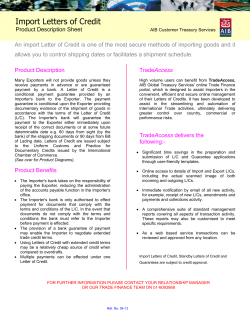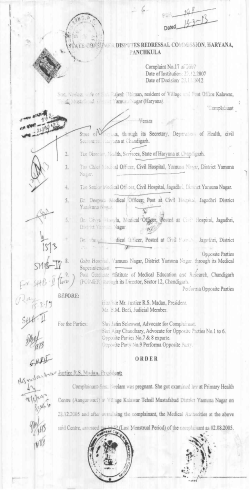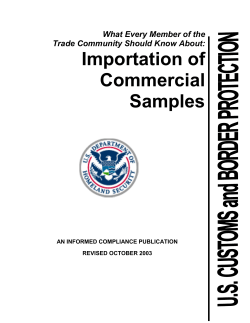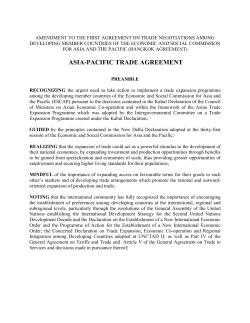
TLA-Three Letter Acronyms December 15, 2010
TLA-Three Letter Acronyms
December 15, 2010
Presenter
Adrienne Graddy-Corporate Director Compliance
Solutions
Associated with BDP since 1994, various compliance roles.
18 month hiatus with major food company initiating both an
import and export compliance program.
Licensed Customhouse broker since 1990.
Delivery and management of BDP internal audits, compliance
manuals, and comprehensive internal and external
training and audit programs.
Overview
•
•
•
In addition to “three” letter acronyms, we will touch
on a few two and four letter acronyms.
Some of the acronyms relate directly to the import
process; some relate to transportation (either
inbound or outbound); and some relate to supply
chain and logistics.
These are some of the most popularly used in
everyday conversation in international trade.
The Path Through The Alphabet
Import entry/transaction specific
Participating Government Agencies (PGA’s)
Transportation/Logistics/Supply Chain
Import entry/process specific
ABI-Automated Broker Interface
CBP’s electronic system used by all brokers to transmit
and receive information concerning CBP clearance and
release of merchandise.
ACH-Automated Clearing House
Electronic debit from specified account for payment of
duties, fees, and taxes on 10th day after entry. May be a
paid from a broker or importer account.
Statement processing allows for payment of many entries
with a single payment.
ACS-Automated Commercial System
CBP’s integrated comprehensive tracking system for the
acquisition, processing and distribution of import datanow migrating to ACE-Automated Commercial
Environment.
ACE-Automated Commercial Environment
CBP’s single clearinghouse data system to replace ACS
Allows earlier visibility for security screening and targeting
ADD-Anti-dumping duty
Additional duty deposited on specific goods from selected
suppliers to discourage under priced selling of foreign
goods in the U.S. that may hurt or disadvantage U.S.
manufacturers.
AII-Automated Invoice Interface
A mirror image of the commercial invoice submitted to
CBP electronically; required for Remote Location
Filing (RLF). Can be used outside the RLF environment.
AMS-Automated Manifest System
System used by the carrier to input data into ACE.
Information transmitted via ABI is matched to
information provided in AMS, to allow CBP release.
CBP-Customs and Border Protection
Department of Homeland Security (DHS) agency
responsible for import/export activity, and securing the
nations borders.
CHB-Customhouse Broker
Individual or corporation licensed by CBP to transact
“Customs Business” on behalf of others.
CVD-Countervailing Duty
Additional duty deposited on specific goods from
selected suppliers to discourage under priced selling of
foreign goods in the U.S. that may hurt or
disadvantage U.S. manufacturers.
C-TPAT-Customs Trade Partnership Against
Terrorism
Security program established by CBP after 911 to secure the import supply chain from point
of origin to final destination in the U.S.
Program is voluntary; benefits extended to
importers in exchange for participation.
DHS-Department of Homeland Security
A Cabinet department of the U.S. federal government
with the primary responsibilities of protecting the
territory of the U.S. from terrorist attacks and
responding to natural disasters.
DOC-Department of Commerce
Their mission is to help make American businesses
more innovative at home and more competitive abroad
and is comprised of 12 different agencies responsible
for everything from weather forecasts to patent
protection.
DOJ-Department of Justice
The U.S. federal executive department responsible for
the enforcement of the law and administration of
justice, led by the Attorney General, who is nominated
by the President.
FA-Focused Assessment
Based on selection criteria of CBP, an FA is a full
blown audit of your import transactions; advance
written notification is provided, opening conference,
closing conference, and recommendations for
compliance improvements. CBP may be on site for an
extended period of time; many of the audit processes
involve accounting/finance, recordkeeping, and your
company’s compliance program including a compliance
manual.
FTA-Free Trade Agreements
Goods are entered into the US duty free or at a reduced
duty rate, under specific requirements and/or
documentation.
FTZ-Foreign Trade Zone
A secure area under CBP supervision that is considered
outside the “Customs territory of the U.S.” Internationally,
they are known as free-trade zones.
GO-General Order
Goods are taken into a CBP General Order warehouse
if entry is not filed within 15 days after arrival of goods. Items
remaining beyond six months are considered abandoned
and can be destroyed or sold at auction by CBP.
GSP-Generalized System of Preferences – 1974
Duty free program allowing for duty free treatment of
goods from specific countries. Special terms and
conditions. Must be renewed periodically by Congress.
HMF-Harbor Maintenance Fee
Fees assessed on import and export shipments to cover
maintenance of harbors; assessment based on value of
the shipment and is currently at .125%.
HTSUS-Harmonized Tariff Schedule of the United
States
An organized numeric listing of goods and their applicable
duty rates for commodities imported into the U.S.
This book also defines statistical reporting requirements
IOR-Importer of Record
U.S. party responsible to comply with all laws and
regulations governing importation of goods, including record
retention, duty payment, Reasonable Care
IPR-Intellectual Property Rights
Articles of foreign or domestic manufacture bearing a mark
or name copying or simulating a recorded trademark or
trade name will be denied entry and are subject to forfeiture.
U.S. trademarks, U.S. trade names and U.S. copyrights may
be recorded with CBP for protection.
ISA-Importer Self Assessment
IOR monitors own compliance in exchange for less oversight
from CBP.
MPF-Merchandise Processing Fee
Fees charged by CBP for the processing of
paperwork (and other related expenses) on most imports.
Assessment is based on .21% of the value of the goods,
minimum $25.00, maximum $485.00 per entry.
MID-Manufacturers Identification Code
A CBP constructed code which indicates the invoicing party
on the commercial invoice.
NAFTA-North American Free Trade Agreement
Law signed into effect December 8, 1993 that included the
“Mod Act”. This preferential duty program allows for duty
free treatment of goods shipped between the U.S., Canada
& Mexico.
NDC-Non-dutiable Charge
With appropriate Incoterms, international transportation
and insurance may be deducted from the dutiable value,
prior to duty calculation.
NDC’s can only be deducted based on actual costs.
Foreign inland freight may or may not be deductible.
NILS-National Importer Liquidation Service
Compilation of all entries made by a single importer,
regardless of number of brokers filing on their behalf.
This information is furnished to the single designated
broker electronically through ABI.
NTR-Normal Trade Relations
Status granted to individual countries by the U.S.
allowing for importation of goods originating in
those countries to receive preferential duty treatment.
Formerly known as MFN (Most Favored Nation)
PEA-Post Entry Amendment
Document and method to make correction on a post entry
basis; can be submitted as soon as error is discovered, but
not later than 20 days prior to liquidation of an entry.
PMS-Periodic Monthly Statement
Duty is paid to CBP on the 15th business day of
following month after release. This can allow for up
to 45 days “float” of duty payments.
POA- Power of Attorney (CBP Form 5291)
Document completed by an officer of an importer
authorizing named entity to transact “Customs business”
on their behalf. All BDP employees have an employee POA
issued by the corporate regulatory compliance group
granting permission to sign CBP documents.
OASIS-Operational and Administrative System for
Import Support
This is the electronic system that is used to input and
transmit FDA information on commodities that are subject
to FDA jurisdiction. The system resides within CBP’s ACS,
which serves as a pass through mechanism for the data.
QRA-Quick Response Audit
An audit done by CBP on a single area/focus, i.e. Chapter
98, GSP, etc. Audit referral can come from anyone within
CBP. Although limited to a single focus, can be expanded
based on CBP’s review of the single issue.
RLF-Remote Location Filing
Allows approved participants to electronically file an entry
from a location other than where the goods will arrive or be
examined. Paperless by definition; however entries that
Require paper documentation for PGA’s cannot be filed via
RLF. Transmissions must exactly mirror the paper
documentation.
SEB-Single Entry Bond (Single Transaction Bond STB)
Importers obtain a single entry bond for a single shipment. It
covers only the entry or transaction for which it was written.
The bond amount for a single entry bond is not less than the
total entered value plus all duties, taxes, and fees. If
merchandise is subject to other federal agency requirements
or is restricted merchandise, the bond amount set is not less
than three times the total entered value of the merchandise.
TEV-Total Entered Value
Amount listed on the CBP 7501, indicating the total value of
the goods entered. and the value on which duties and fees
are calculated. May be the same or different as the Invoice
Value (IV)
Participating Government Agencies
(PGA’s)
Participating Government Agencies
•
•
•
There are many other government agencies that also
require information prior to release of goods imported
into the U.S.
These agencies have first right of refusal to disallow
entry of goods.
Some agencies receive information electronically and
others in hard copy documentation.
Participating Government Agencies
APHIS-Animal and Plant Inspection ServiceDepartment of Homeland Security
Policies to safeguard the U.S. from agricultural pests;
WPM (wood packing material) ; permits to import timber
or timber products;
PPQ-plant protection and quarantine; importation and
exportation of live animals (veterinary services); foot and
mouth disease; importation of special meats such as
mutton (prohibited). Lacey Act enforcement.
Hard copy documentation required in most cases.
Participating Government Agencies
ATF-Alcohol, Tobacco & Firearms-Department of
Justice
Regulates the import of alcoholic spirits, wines and
malt liquors, and the requirements for packaging and
labeling; manufactured tobacco, cigarettes and cigars
(Cuban cigars are prohibited).
IR-Internal Revenue taxes due on alcohol beverages,
tobacco products and cigarette papers and tubes.
Hard copy documentation is required in most cases.
Participating Government Agencies
CPSC-Consumer Products Safety CommissionIndependent Regulatory Agency-1972
Mandated to “protect the public against unreasonable
risks of injuries and deaths associated with consumer
products”.
Have jurisdiction of approximately 15,000 products such
as drip coffee makers, lawn mowers, pool covers,
ATV’s, and toys.
Hard copy documentation is required upon request from
the CPSC.
Participating Government Agencies
DEA-Drug Enforcement Administration-Department of
Justice
Regulates the importation and exportation of controlled
substances. Hard copy forms (import permit and export
permit) are required.
DOT-Department of Transportation-Federal Highway
Administration
Regulates carriage of goods within the U.S.; hazardous
materials, overweight containers, importation of motor
vehicles; motor vehicle equipment subject to Federal Motor
Vehicle Safety, Bumper and Theft Prevention standards.
Import data can be transmitted electronically.
Participating Government Agencies
EPA-Environmental Protection Agency-Independent
Regulatory Agency
Regulates importation of insecticides, fungicides,
rodenticides (FIFRA), pesticides, Freon, (banned
from import), devices, toxic substances (under TSCA);
Works with DOT on importation of automobiles under
Federal Air Pollution Regulations.
Some data concerning auto imports can be transmitted
electronically, however a majority of imports require hard
copy documentation.
Participating Government Agencies
FCC-Federal Communications CommissionDepartment of Heath and Human Services, Food
and Drug Administration - FDA
Regulates products subject to radiation control
standards (electronics such as television receivers,
microwave ovens, certain laser products, diagnostic
equipment such as x-ray machines, etc).
Hard copy import documentation is required, although a
small portion can be transmitted electronically.
Participating Government Agencies
FDA-Food and Drug Administration-Independent
Regulatory Agency
Regulates the importation of cosmetics, foods, drugs, the
re-labeling of these items, & medical devices for safety,
effectiveness, and special controls.
A seven character alpha-numeric code is transmitted
electronically. This code identifies the industry, product,
type of packaging and dimensions, foreign supplier &
corresponding authorization code.
FDA Bio-Terrorism Act BTA
Prior Notice
PN-Prior Notice is to be filed with FDA up to10 days prior to
arrival at first USA port.
Articles of food or drink used for man or animals,
including dietary supplements
Chewing gum
Articles used as components of any such article except
for food contact substances and pesticides
ALL shipments must include a facility registration number.
Participating Government Agencies
FWS-Fish and Wildlife Service-Department of the
Interior
Regulates endangered species, captive-bred wildlife,
domesticated animals, insects, birds, fish, for
importation and exportation.
FWS usually works with zoos and scientists, and has
regulations concerning humane and healthy transport.
Import data can be transmitted electronically, but hard
copy documentation is additionally required.
Most common imports deal with sponges and feathers.
Participating Government Agencies
NOAA-National Oceanic & Atmospheric Administration
National Marine Fisheries Service-Department of
Commerce
Regulates all importation of frozen tuna and/or processed
tuna products.
Hard copy documentation is required.
Participating Government Agencies
TSCA-Toxic Substances Control Act-EPA -1976
EPA has been given broad authority to issue regulations
designed to gather health/safety and exposure
information on, require testing of, and control exposure to
individual chemical substances, chemical mixtures and
articles.
All imports of chemical substances, chemical mixtures or
articles are subject to TSCA. Import data can be
transmitted electronically, however can change with each
entry of product.
TSCA is currently undergoing modernization to share
resources, information, and expectations with the trade.
Transportation/Logistics/Supply Chain
B/L or BOL-Bill of Lading
Document used to move ocean cargo. One original of three
must typically be presented to obtain possession of the
shipment.
CFR-Code of Federal Regulations
Publications of regulations i.e. Customs Regulations are
19CFR (called Title 19); FDA Regulations are contained in
21CFR (called Title 21); EPA Regulations are contained in
40CFR (called Title 40), etc. CFR’s cover all types of
regulations such as Housing and Urban Development
(24CFR), the FAA (14CFR), etc.
CFS-Container Freight Station
CBP bonded facility that it utilized for devanning import
consolidations. Goods are discharged from a CFS upon
presentation of a certified CBP release. Goods must be
released within 15 days of arrival or can be taken into
General Order (GO) by CBP. This facility cannot be used
as an ongoing storage facility, nor can cargo be sorted,
packaged, or otherwise manipulated.
DG-Dangerous Goods
DO-Delivery Order
Document to indicate delivery instructions for inland (usually
local) movement of goods after Customs clearance. Goods
move on this document as domestic cargo.
FMC-Federal Maritime Commission
The Bureau conducts investigations into and monitors the
activities of ocean common carriers, ocean transportation
intermediaries ("OTIs")(non-vessel-operating common
carriers ("NVOCCs"), freight forwarders, shippers, ports and
terminals, and other persons to ensure compliance with the
statutes and regulations administered by the Commission.
Investigations are conducted into alleged violations of the
full range of statutes and regulations administered by the
Commission.
IATA-International Air Transportation Association
All airline rules and regulations are defined by
IATA. The main aim is to provide safe and secure
transportation to its passengers.
ICAO-International Civil Aviation Organization
Adopts standards and recommended practices
concerning air navigation, its infrastructure, Flight
inspection, prevention of unlawful interference,
and facilitation of border-crossing procedures for
international civil aviation.
IE- Importation for exportation
IT- Goods passing through a the U.S., in bond, (CBP
custody), without entering the commerce of the U.S.
Duty has yet to be paid on the goods.
Incoterms-International Commercial Terms
Eleven terms of international shipment that identify risks
between buyer and seller. Not law-do not convey title.
Newest version effective January 2011, titled Incoterms
Rules 2010.
IMDG Code-International Maritime Dangerous Goods
Code
International guideline to the safe transportation or
shipment of dangerous goods or hazardous materials by
water on vessel.
LC-Letter of Credit
A document issued by a bank, on behalf of an importer or
exporter, guaranteeing payment for delivery of goods,
subject to successful completion of the terms and
conditions stipulated.
NVOCC-Non-vessel Operating Common Carrier
A transport service that purchases “space” on vessels
from a common carrier; example, BDP Transport.
An NVOCC does not own or operate vessels but files
rates into a tariff governed by the FMC.
Operates almost identically as a carrier who owns vessels
without having the liability of ownership, maintenance, or
insurance.
PL or P/L Packing List
Document prepared by the supplier of the goods which
indicated the kind and quantity of merchandise contained
in the shipment.
WPM -Wood Packing Material
Logs, lumber, dunnage, crating, pallets, drums, cases,
packing blocks, spools, skids and other
unmanufactured wood items must be treated or
fumigated with preservatives/chemicals and marked
with approved international mark.
This mark consists of the International Plant Protection
Convention (IPPC) logo and the two letter International
Standards Organization (ISO) code for the country
which treated the WPM.
Paper certifications are not required, nor accepted.
Thank you!
BDP International thanks you for your
time and participation. Our next webcast
in this complimentary series will be
Duty Free Opportunities
on Wednesday, January 12 at 1:00PM
Central time.
Thank you!
To register for the January 12 or any other
session, go to:
http://www.bdpinternational.com/news/Events.asp
Registration is required for each event.
Upon successful registration, you will receive an email with logon details.
A copy of this presentation will be available on this same
link Thursday afternoon listed under today’s date and the
event
BDP’s 101 Complementary Webinar-Three Letter Acronyms
Contact Information
Adrienne Graddy
Corporate Director, Compliance Solutions
875 Devon Avenue
Elk Grove Village, IL 60007
Direct: 847-350-2156
Email: [email protected]
www.bdpinternational.com
© Copyright 2026





















